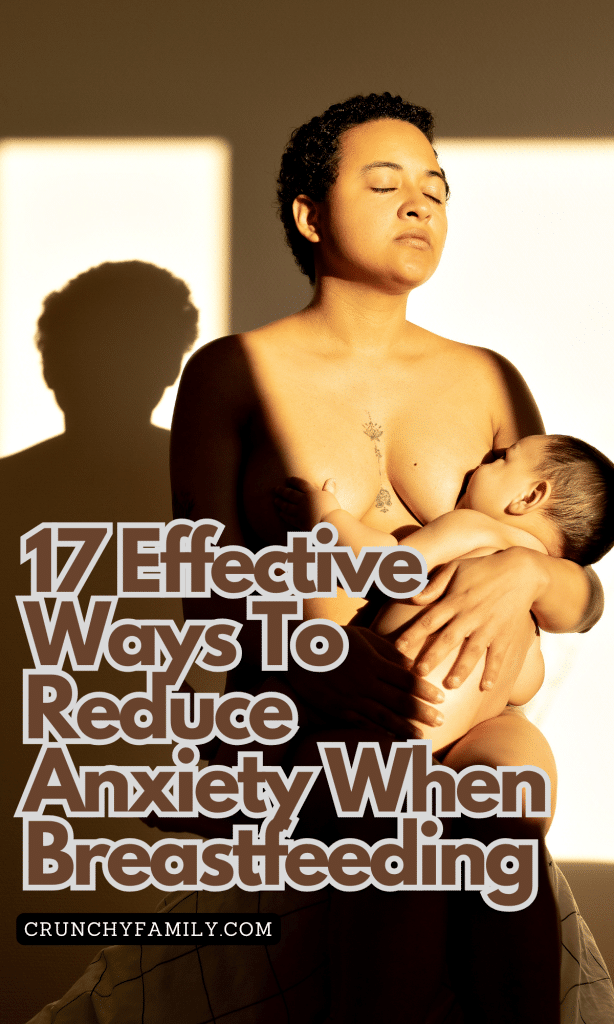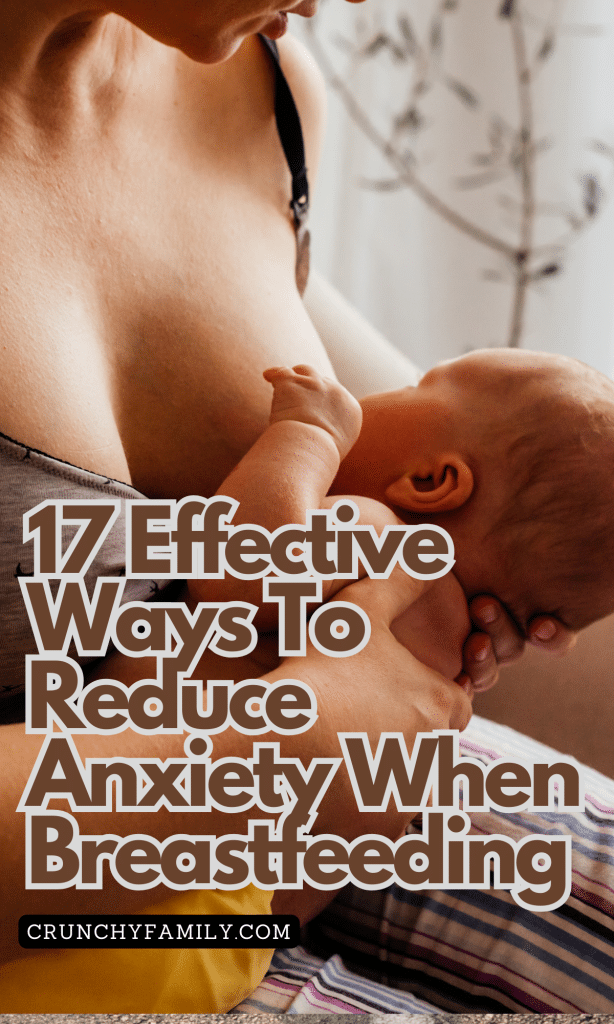Breastfeeding my daughter until she was 3 years old was an enriching experience, but it didn’t start easy. We faced hurdles right from the start with a tongue and lip tie that made breastfeeding not only difficult but painful.
However, with the support of a certified lactation consultant and correcting the tongue tie, we found our rhythm. This journey taught me the importance of support, knowledge, and gentle patience in overcoming breastfeeding challenges, including anxiety.
Here, we’ll explore 17 supportive strategies to help you feel more relaxed and confident. Remember, you’re doing an incredible job, and it’s okay to seek support when you need it.

Table of Contents
- 1. Understand it
- 2. Stay Informed
- 3. Lactation Consultant
- 4. Support System
- 5. Skin-to-Skin
- 6. Deep Breathing
- 7. Me Time
- 8. Monitor Your Health
- 9. Limit Social Media
- 10. Exercise Regularly
- 11. Network
- 12. Healthy Diet
- 13. Sleep
- 14. Relaxation Techniques
- 15. Realistic Goals
- 16. Journal
- 17. Professional Help
1. Understand it

Breastfeeding can trigger physiological and psychological responses, such as milk letdown or intense feelings due to hormonal fluctuations. Recognizing these as normal can help you manage expectations and reactions, reducing anxiety.
Additionally, understanding the health benefits of breastfeeding can empower you. The World Health Organization recommends exclusive breastfeeding for the first six months, as it significantly lowers the risk of infections and diseases in newborns while also benefiting maternal mental health.
2. Stay Informed
Understanding the basics of milk production and common breastfeeding challenges can reassure you that your experiences are typical and manageable. Lactation specialists and healthcare providers can offer valuable insights and affirm that your body is capable of producing enough milk and that helped me so much.
A systematic review of breastfeeding education shows that informed mothers are more likely to establish successful breastfeeding practices, reducing the likelihood of postpartum anxiety.
3. Lactation Consultant

Certified lactation consultants are invaluable in navigating breastfeeding challenges. They can offer techniques for improving milk release and reducing discomfort, which in turn can alleviate anxiety.
4. Support System
Engaging with family members, friends, or an online support group can validate your feelings and provide practical advice and emotional support. Having a supportive partner in this process can fundamentally unload some of the pressure, sharing the emotional and practical burdens of new parenthood. This partnership can be a cornerstone in managing daily stresses and enhancing the overall experience of breastfeeding.
This connection is crucial, especially in the first few months postpartum, as it can help prevent the isolation that often leads to anxiety and depression in new mothers. A partner’s active involvement and understanding can significantly mitigate feelings of loneliness and overwhelm, providing a solid foundation for navigating the challenges of this significant life change together.
5. Skin-to-Skin

Skin contact with your baby can increase hormone levels that boost milk supply and reduce stress, fostering a calming connection. This practice is essential from the very start, as highlighted by my personal experience with the Golden Hour immediately after my daughter was born. During this time, uninterrupted skin-to-skin contact significantly strengthened our bond and facilitated a more effective breastfeeding start.
This practice not only facilitates a better milk letdown reflex but also stabilizes the baby’s heart rate and breathing, providing calming effects for both mother and child. Having experienced this profound connection firsthand, I fully understand its importance.
It’s a foundational practice that supports both physiological and psychological well-being, enhancing the overall breastfeeding experience and helping to establish a strong, early bond between mother and baby.
6. Deep Breathing
Deep breaths can help manage the physical symptoms of anxiety, such as increased blood pressure and the flight response. This simple technique can be a quick fix during stressful moments, instantly helping to calm the nervous system and slow the heart rate, providing immediate relief. Regular practice of deep breathing exercises can also increase overall oxygen flow, which enhances the body’s ability to function and promotes a feeling of calmness.
Additionally, deep breathing can help mitigate the onset of panic attacks, providing a sense of control over one’s physiological response. By focusing on slow, controlled breaths, you can disrupt the body’s stress response and prevent a full-blown panic attack. This practice not only helps during high-stress situations but also contributes to a more prolonged ability to manage stress, making it a valuable tool for new parents dealing with the challenges of the postpartum period.
7. Me Time

Self-care is crucial. Even short breaks can rejuvenate your mind and body, improving your overall ability to cope with stress. For many breastfeeding parents, this time can be used for gentle exercise, reading, or simply resting, all of which are important for maintaining good mental health. In my own experience, carving out moments for myself to engage in simple self-care practices was incredibly beneficial.
Whether it was taking a long, soothing bath, watching TikToks to distract and amuse myself, dancing to my favorite songs, or visiting friends, these activities provided much-needed relief and a sense of normalcy in my daily routine. These breaks helped me to recharge and return to my parenting duties with renewed energy and a more positive outlook, underscoring the importance of self-care for new parents.
8. Monitor Your Health
Postpartum depression and anxiety disorders can manifest as negative thoughts or depressive symptoms. Healthcare professionals can provide screenings and support, ensuring your mental health care is a priority.
It’s important for new mothers to recognize that symptoms like intrusive thoughts or intense negative feelings can be signs of a deeper mental health issue that requires professional intervention.
9. Limit Social Media
While social media can be a source of support, it can also lead to comparisons and negative emotions. Limiting your screen time might help keep anxiety at bay. Remember, social media often presents an idealized picture that may not reflect real life, which can be detrimental to a mother’s ability to feel confident in her own parenting journey.
10. Exercise Regularly

Moderate exercise, approved by your healthcare provider, can alleviate stress, improve your mood, and stabilize hormone levels. Postpartum exercise can also help with weight management, which can be a concern for new mothers, thus reducing one risk factor for postpartum depression.
11. Network
Connecting with a breastfeeding network can offer reassurance and resources, reducing feelings of isolation and stress. These networks are great places to share experiences and solutions that have worked for others, possibly alleviating the feeling of being alone in your struggles.
12. Healthy Diet
Eating well supports milk production and can impact your mood and energy levels, helping to manage stress and fatigue. A balanced diet can also help mitigate some of the physical symptoms of anxiety, such as low energy levels and poor concentration.
13. Sleep
Sleep deprivation is a major stressor. Syncing your sleep with your baby’s naps can help reduce exhaustion and anxiety. It’s also beneficial for the physiological recovery of the body, especially if the birth involved a cesarean section or complications.
I didn’t find it super easy to nap when the baby was asleep but whenever I did I noticed a difference for sure. My whole mood changed and I had way more energy.

14. Relaxation Techniques
Techniques such as yoga, meditation, or even hobbies that relax you can be effective ways to manage anxiety. Meditating whenever you can for as little as 5 minutes helped me so so much. You can even meditate whilst breastfeeding.
These activities not only reduce stress but also improve overall well-being, making them a valuable part of the postpartum care routine.
15. Realistic Goals
Setting achievable breastfeeding goals can prevent feelings of inadequacy and the pressure to perform perfectly. Understand that every mother’s ability to produce breast milk varies, and breastfeeding for a shorter duration than intended is perfectly acceptable
Also never compare your journey to others. Definitely create a network but your journey, your body and your baby will work completely different ways from others.
16. Journal
Writing down your thoughts can be a therapeutic way to deal with anxiety, helping to identify triggers and patterns in your emotional state. Journaling can also provide clarity in moments of overwhelming emotions and help in making clinical decisions with your health care provider.

17. Professional Help
If anxiety affects your daily life, consulting with mental health care professionals is crucial. They can provide strategies or medications to help manage your symptoms effectively. This step may be especially important for those experiencing postpartum mood disorders or other mental health problems that affect their ability to cope with daily tasks.
Breastfeeding, while beneficial for both mother and baby, can also add a lot of stress, particularly if there are complications like low milk supply or painful lactation. The act of breastfeeding itself can induce a psychological response, influencing mood and stress levels.
Consulting with a lactation specialist can be beneficial for mothers experiencing these difficulties. It’s important for new mothers to recognize that needing help does not make them any less of a good parent. In fact, seeking support is a key step in maintaining both their health and their baby’s.

Sadly, a lot of new mums experience symptoms of anxiety, and without adequate support, this can spiral into a more significant anxiety disorder. Negative reactions from peers or a lack of support can exacerbate feelings of inadequacy or failure especially when it comes to breastfeeding. It’s important for those around new mums to be aware of the signs of psychological distress and provide support or suggest professional help as needed.
Breastfeeding is not just about nourishing your baby; it’s a complex interplay of emotional, physical, and psychological factors. It’s normal to feel overwhelmed, but with the right strategies, you can significantly reduce anxiety.
Remember, asking for help and taking care of your own health are important steps towards a fulfilling breastfeeding experience. You’re not alone in this journey, and there are plenty of resources and people ready to support you. Keep going, you’re doing great!

More related reads:
3 thoughts on “17 Effective Ways To Reduce Anxiety When Breastfeeding”